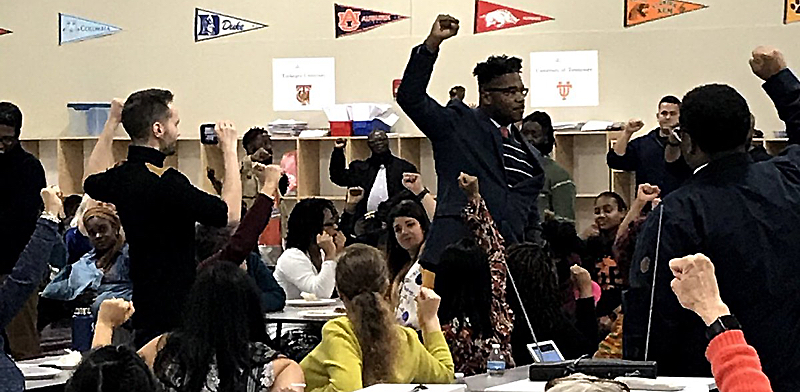
Nov 8, 2019 12:00:00 AM
Got you with the title, didn’t I? LOL!
But since I have you here, let me tell you how to throw a big ass house party and change the game for our kids.
Now, this isn’t the house party you saw in the classic 90s movie with rap artists, Kid ‘n Play.
It’s an old school tactic coined in the early 1900s by Mexican American organizer, Fred Ross, that’s commonly used to plan strategies in organizing for change. It’s actually called a house-meeting.
In my years as an organizer, one of the main issues I’ve seen—aside from marginalized communities feeling outright disempowered—is that people just don’t know where to start. And I’ll be the first to admit that this work can be a little complicated. It’s not for the meek and mild, nor for those who are unable to run the distance. But [pullquote]if you’re feeling frustrated with the status quo, you can do something by simply having a conversation or hosting a house-meeting.[/pullquote]
Here’s the rundown.
Boom, you have a house-meeting!
And if it’s a good house meeting, everyone will leave fired up with action steps and ready to have these conversations with even more people. [pullquote position="right"]Before you know it, you’ve potentially started a movement.[/pullquote]
Now if you’re anything like me, you’ve zoned out by now probably thinking about tacos, bills and why you have gritty stuff in your navel and you haven’t been to the beach—and the only thing that can get you back are visuals and actual examples.
Don’t worry, I got you! Real-life case study loading now.
Nashville’s reading proficiency rates are dismal—I mean, 7 out of 10 third graders cannot read.
My friend, Vesia Hawkins, is and has been sick of it. For the longest, she’s been issuing verbal beatdowns and Sunday school lessons on her blog, "Volume and Light," around issues of literacy proficiency and ways to improve them.
Last week she stepped her game up and hosted the event, “A Family Affair: Breaking the School-to-Prison Pipeline Starts with Reading,” which turned out to be a big ass house-meeting at Purpose Preparatory Academy in Nashville.
She made it happen by hitting up a few of her friends—principals, activists, parents, educators and nonprofit leaders and told them she wanted them to be part of this thing she was doing.
She circulated a flyer on social media and in the community to let everyone know what was going down and how important it was for them to participate in this conversation.
And of course, she dished out some good old Nashville cooking.
Vesia had an all-star cast of panelists to discuss low rates of literacy proficiency and their impact on communities of color.
Lagra Newman is the principal of Purpose Prep and a freedom fighter for education. Her school was recognized as a reward school in Tennessee, by the way.
Leader of the parent group Nashville P.R.O.P.E.L., Sonya Thomas, told her story about struggling to get her son support because he wasn’t being taught to read. Her words would move any parent or activist to tears—and to action.
Dr. Jarred Amato is working to break the school-to-prison pipeline through his organization, Project LIT. Parent Anna Thorsen is a relentless advocate for dyslexia rights who has worked to pass several bills in Tennessee and Allison Simpson, mother and devoted education activist, ran for a seat on the Metro Nashville Public Schools Board.
But the most important people at the party/meeting were the students and parents.
There had to be a minimum of 60 families in the room listening intently, sharing their stories and concerns, including a high school student who said there’s been a lapse in the quality of her education since transitioning from eighth grade to high school.
The energy was high. We had food, conversations, questions and we had the all-important charge for action led by a powerful activist, Treymanye Haymer, who’s dispelling the myth that Black fathers aren’t actively involved in their children’s education.
We started something in Nashville that night. We came together because we are concerned about and fighting for literacy proficiency for our kids.
And if you’ve made it to the end of my “How-To” guide, I hope you’ll be inspired to start something soon, too. Start with a house-meeting.
Tanesha Peeples is driven by one question in her work—“If not me, then who?” As the former Deputy Director of Activist Development for brightbeam, Tanesha merges the worlds of communications and grassroots activism to push for change in the public education system. Her passion for community and relentless mission for justice and liberation drive her in uplifting and amplifying the voices and advocacy of those that are often ignored. Tanesha wholeheartedly believes that education is the foundation for success. Her grand vision is one where everyone—regardless of ethnicity, socioeconomic status, gender or ZIP code—can have access to a comfortable quality of life and enjoy the freedoms and liberties promised to all Americans. And that's what she works towards every day.
Few issues in education spark more tension and debate than standardized testing. Are they a tool for equity or a burden on students? A necessary check on school systems or a flawed measure of...
Charter schools are public schools with a purpose. Operating independently from traditional school districts, they're tuition-free, open to all students, and publicly funded—but with more flexibility...
Despite the benefits of a diverse teaching force, prospective teachers of color fall out of our leaky preparation pipeline at every stage: preparation, hiring, induction, and retention. Here’s what...
Ed Post is the flagship website platform of brightbeam, a 501(c3) network of education activists and influencers demanding a better education and a brighter future for every child.
© 2020-2025 brightbeam. All rights reserved.
Leave a Comment